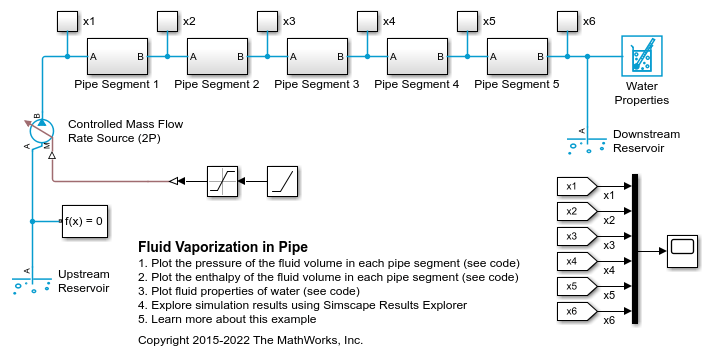Sistemas de fluidos bifásicos
Explore ejemplos que ilustran modelado, control y simulación de sistemas de fluidos bifásicos.
Información relacionada
Ejemplos destacados
Cavitación en un fluido bifásico
Este ejemplo muestra cómo se pueden utilizar los componentes de un fluido bifásico para simular una cavitación. El modelo es un convertidor mecánico de traslación dirigido por una fuente de presión oscilante. Durante la parte negativa del ciclo de la fuente de presión, el fluido cavita, reduciendo la fuerza producida por el convertidor. Como consecuencia, el desplazamiento del convertidor va a la deriva y no regresa a la posición inicial.
Fluid Vaporization in Pipe
Model the vaporization of water to generate steam. Liquid water enters the pipe at 370 K at a rate of 1 kg/s. The pipe is heated to 1000 K, causing the water flowing inside pipe to saturate.
Refrigeración con fluido bifásico
En este ejemplo se muestra un modelo de ciclo de refrigeración por compresión de vapor utilizando componentes de fluido bifásico. El compresor conduce el refrigerante R-134a a través del condensador, una válvula de expansión y un evaporador. El gas caliente que sale del compresor se condensa en el condensador a través de la transferencia de calor al ambiente. La presión disminuye a medida que el refrigerante atraviesa la válvula de expansión. La disminución de la presión reduce la temperatura de saturación del refrigerante. Esto permite que hierva en el evaporador, ya que absorbe calor del compartimento refrigerador. A continuación, el refrigerante regresa al compresor para repetir el ciclo. El controlador activa y desactiva el compresor para mantener la temperatura del compartimento refrigerador dentro de un rango aproximado a la temperatura deseada.
Ciclo Rankine (turbina de vapor)
En este ejemplo se muestra un modelo de turbina de vapor basada en el ciclo Rankine. El ciclo incluye sobrecalentamiento y recalentamiento para evitar la condensación en la turbina de alta presión y en la turbina de baja presión, respectivamente. El ciclo también tiene regeneración pasando el vapor extraído a través de calentadores de agua cerrados para calentar el agua y mejorar la eficiencia del ciclo.
Ciclo de refrigeración con CO2 transcrítico (R744)
Este ejemplo modela un ciclo de refrigeración por compresión de vapor en el que la parte de alta presión del ciclo opera en la región de fluido supercrítico. El refrigerante es dióxido de carbono (CO2), denominado también R744 en esta aplicación.
MATLAB Command
You clicked a link that corresponds to this MATLAB command:
Run the command by entering it in the MATLAB Command Window. Web browsers do not support MATLAB commands.
Seleccione un país/idioma
Seleccione un país/idioma para obtener contenido traducido, si está disponible, y ver eventos y ofertas de productos y servicios locales. Según su ubicación geográfica, recomendamos que seleccione: .
También puede seleccionar uno de estos países/idiomas:
Cómo obtener el mejor rendimiento
Seleccione China (en idioma chino o inglés) para obtener el mejor rendimiento. Los sitios web de otros países no están optimizados para ser accedidos desde su ubicación geográfica.
América
- América Latina (Español)
- Canada (English)
- United States (English)
Europa
- Belgium (English)
- Denmark (English)
- Deutschland (Deutsch)
- España (Español)
- Finland (English)
- France (Français)
- Ireland (English)
- Italia (Italiano)
- Luxembourg (English)
- Netherlands (English)
- Norway (English)
- Österreich (Deutsch)
- Portugal (English)
- Sweden (English)
- Switzerland
- United Kingdom (English)




